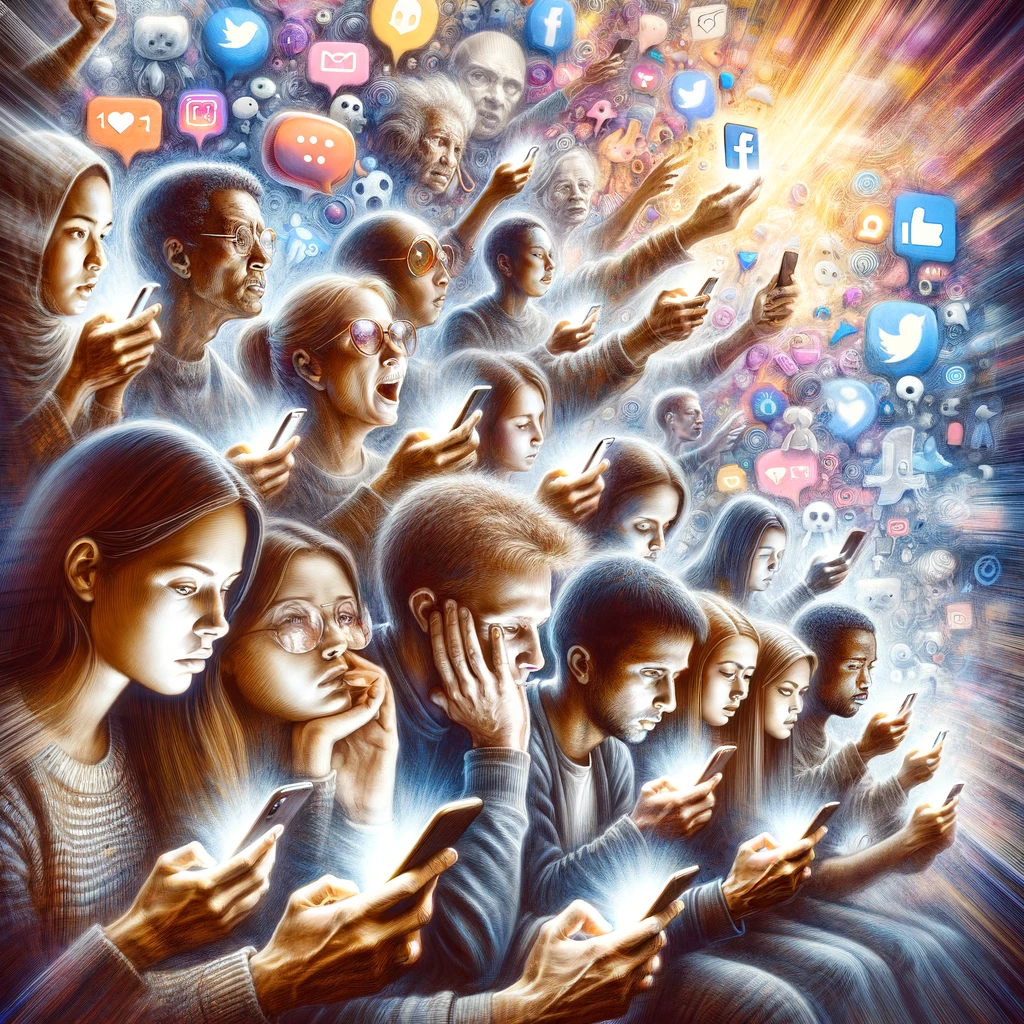Signs of social media addiction can vary, but here are some common indicators:
1. Excessive Time on Social Media: Spending a significant portion of the day on social media platforms, often at the expense of other activities or responsibilities.
2. Neglect of Personal Life: Neglecting personal relationships, work, or studies due to the time spent on social media.
3. Mood Changes: Experiencing mood swings, irritability, or anxiety when not able to access social media.
4. Withdrawal Symptoms: Feeling restless, anxious, or uncomfortable when not using social media.
5. Over-Preoccupation with Social Media: Constantly thinking about social media even when not using it, or planning the next opportunity to log on.
6. Interference with Daily Activities: Allowing social media use to interfere with daily activities, such as eating, sleeping, or engaging in face-to-face interactions.
7. Decreased Physical Activity: A noticeable decrease in physical activity and increase in sedentary behavior due to time spent on social media.
8. Use as an Emotional Escape: Using social media as a means to escape from negative feelings or reality.
9. Impact on Mental Health: Experiencing negative impacts on mental health, such as increased feelings of loneliness, depression, or anxiety.
10. Ignoring Negative Consequences: Continuing to use social media despite being aware of its negative consequences on personal, social, or professional life.
It’s important to note that these signs can also be indicative of other issues and not solely social media addiction. If someone is showing these signs and it’s impacting their life negatively, it may be helpful to seek professional advice.
Scientific research
Scientific research on social media addiction has been extensive, exploring various aspects such as its development, underlying causes, and impacts on well-being. Key findings from recent studies provide a multi-dimensional perspective on this phenomenon.
One significant area of research focuses on the role of emotions, both positive and negative, in social media addiction. Positive emotions often drive ‚reward-seeking‘ behavior, where users chase the dopamine rush associated with social validation on these platforms. This can lead to increased engagement and prolonged usage. On the other hand, negative emotions may lead individuals to use social media as a coping mechanism or as a means of escapism, potentially leading to addictive patterns. Negative emotions can also exacerbate the addictive behavior, especially through mechanisms like social comparison, where users compare themselves to others, potentially amplifying feelings of inadequacy and deepening the negative emotional state.
Another research angle involves the concept of attachment and its relationship with social media addiction. Studies have evaluated the connection between adult attachment styles and social media addiction, finding that certain attachment styles, such as anxiety attachment and avoidant attachment, significantly elicit social media addiction. This suggests that how individuals form and maintain interpersonal relationships can influence their susceptibility to social media addiction.
Social influence also plays a crucial role in social media addiction. The reinforcement loop created by algorithms, which show content from close connections or popular trends, can lead to increased and repetitive engagement on these platforms. Individuals who witness their peers frequently engaging with or endorsing certain content can be influenced to conform to these behaviors, potentially leading to a cycle of addictive behavior. The impact of social influence can vary based on personal factors like self-esteem and the need for social validation, making some individuals more susceptible to addiction under strong social influence.
The concepts of flow, perceived enjoyment, and habit formation have also been addressed in the context of social media addiction. The state of flow, where users experience deep immersion in digital experiences like social media, can amplify the appeal of these platforms and make users more prone to spend extended periods on them. This repeated usage can gradually evolve into addictive behaviors.
A comprehensive review of 25 theories and models used in 55 empirical studies of social media addiction highlighted the need for a holistic theoretical understanding of how social media addiction develops. This review pointed out that addictive use of social media is associated with several negative consequences, such as reduced productivity, unhealthy social relationships, and reduced life satisfaction. However, it also noted the limitations in existing theoretical frameworks and the necessity for future research to develop more effective educational and intervention programs to prevent social media addiction.
Overall, these studies underscore the complexity of social media addiction, influenced by a variety of factors including emotional states, attachment styles, social influences, and behavioral patterns. This multidisciplinary approach is crucial for a better understanding of the phenomenon and for developing more effective strategies to address it.










